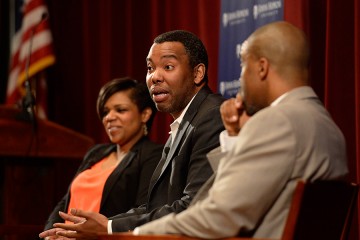Nathan Connolly, an assistant professor of history at Johns Hopkins University, writes about the economics behind the recent unrest in Baltimore in today's issue of The New York Times.
In "Black Culture Is Not the Problem," Connolly asserts that "policy and politics" played a larger role in the events that unfolded earlier this week in Baltimore than did some shortcoming of black culture. From The Times:
Specifically, the problem rests on the continued profitability of racism. Freddie Gray's exposure to lead paint as a child, his suspected participation in the drug trade, and the relative confinement of black unrest to black communities during this week's riot are all features of a city and a country that still segregate people along racial lines, to the financial enrichment of landlords, corner store merchants and other vendors selling second-rate goods.
Connolly, who co-moderated the inaugural JHU Forum on Race in America featuring writer Ta-Nehisi Coates on Thursday morning, echoes Coates' criticism of a system stacked against black families and communities. The solution, he argues, is an honest reassessment of fundamentally biased policies and practices:
Read more from The New York TimesBy avoiding the language of individual failings and degenerate culture, political leaders, black and otherwise, can help us all see the daily violence of poverty. More, they can better use the power they have to do something about it. By calling a nationwide "state of emergency" on the problem of residential segregation, by devising a fairer tax structure, by investing in public space, community policing, tenants' rights and a government jobs program, our leaders can find a way forward.
Posted in Voices+Opinion, Politics+Society
Tagged race, race relationships, baltimore unrest








